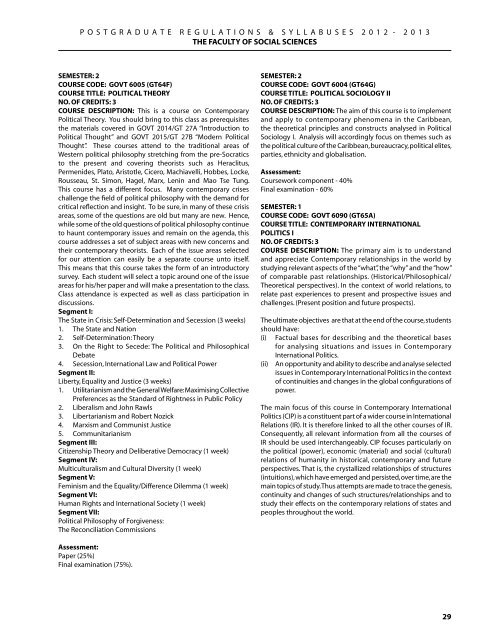Faculty Booklet - The University of the West Indies, St. Augustine ...
Faculty Booklet - The University of the West Indies, St. Augustine ...
Faculty Booklet - The University of the West Indies, St. Augustine ...
Create successful ePaper yourself
Turn your PDF publications into a flip-book with our unique Google optimized e-Paper software.
P O S T G R A D U A T E R E G U L A T I O N S & S Y L L A B U S E S 2 0 1 2 - 2 0 1 3<br />
THE FACULTY OF SOCIAL SCIENCES<br />
SEMESTEr: 2<br />
COUrSE CODE: gOVT 6005 (gT64F)<br />
COUrSE TITLE: POLITICAL THEOrY<br />
NO. OF CrEDITS: 3<br />
COUrSE DESCrIPTION: This is a course on Contemporary<br />
Political <strong>The</strong>ory. You should bring to this class as prerequisites<br />
<strong>the</strong> materials covered in GOVT 2014/GT 27A “Introduction to<br />
Political Thought” and GOVT 2015/GT 27B “Modern Political<br />
Thought”. <strong>The</strong>se courses attend to <strong>the</strong> traditional areas <strong>of</strong><br />
<strong>West</strong>ern political philosophy stretching from <strong>the</strong> pre-Socratics<br />
to <strong>the</strong> present and covering <strong>the</strong>orists such as Heraclitus,<br />
Permenides, Plato, Aristotle, Cicero, Machiavelli, Hobbes, Locke,<br />
Rousseau, <strong>St</strong>. Simon, Hagel, Marx, Lenin and Mao Tse Tung.<br />
This course has a different focus. Many contemporary crises<br />
challenge <strong>the</strong> field <strong>of</strong> political philosophy with <strong>the</strong> demand for<br />
critical reflection and insight. To be sure, in many <strong>of</strong> <strong>the</strong>se crisis<br />
areas, some <strong>of</strong> <strong>the</strong> questions are old but many are new. Hence,<br />
while some <strong>of</strong> <strong>the</strong> old questions <strong>of</strong> political philosophy continue<br />
to haunt contemporary issues and remain on <strong>the</strong> agenda, this<br />
course addresses a set <strong>of</strong> subject areas with new concerns and<br />
<strong>the</strong>ir contemporary <strong>the</strong>orists. Each <strong>of</strong> <strong>the</strong> issue areas selected<br />
for our attention can easily be a separate course unto itself.<br />
This means that this course takes <strong>the</strong> form <strong>of</strong> an introductory<br />
survey. Each student will select a topic around one <strong>of</strong> <strong>the</strong> issue<br />
areas for his/her paper and will make a presentation to <strong>the</strong> class.<br />
Class attendance is expected as well as class participation in<br />
discussions.<br />
Segment I:<br />
<strong>The</strong> <strong>St</strong>ate in Crisis: Self-Determination and Secession (3 weeks)<br />
1. <strong>The</strong> <strong>St</strong>ate and Nation<br />
2. Self-Determination: <strong>The</strong>ory<br />
3. On <strong>the</strong> Right to Secede: <strong>The</strong> Political and Philosophical<br />
Debate<br />
4. Secession, International Law and Political Power<br />
Segment II:<br />
Liberty, Equality and Justice (3 weeks)<br />
1. Utilitarianism and <strong>the</strong> General Welfare: Maximising Collective<br />
Preferences as <strong>the</strong> <strong>St</strong>andard <strong>of</strong> Rightness in Public Policy<br />
2. Liberalism and John Rawls<br />
3. Libertarianism and Robert Nozick<br />
4. Marxism and Communist Justice<br />
5. Communitarianism<br />
Segment III:<br />
Citizenship <strong>The</strong>ory and Deliberative Democracy (1 week)<br />
Segment IV:<br />
Multiculturalism and Cultural Diversity (1 week)<br />
Segment V:<br />
Feminism and <strong>the</strong> Equality/Difference Dilemma (1 week)<br />
Segment VI:<br />
Human Rights and International Society (1 week)<br />
Segment VII:<br />
Political Philosophy <strong>of</strong> Forgiveness:<br />
<strong>The</strong> Reconciliation Commissions<br />
Assessment:<br />
Paper (25%)<br />
Final examination (75%).<br />
SEMESTEr: 2<br />
COUrSE CODE: gOVT 6004 (gT64g)<br />
COUrSE TITLE: POLITICAL SOCIOLOgY II<br />
NO. OF CrEDITS: 3<br />
COUrSE DESCrIPTION: <strong>The</strong> aim <strong>of</strong> this course is to implement<br />
and apply to contemporary phenomena in <strong>the</strong> Caribbean,<br />
<strong>the</strong> <strong>the</strong>oretical principles and constructs analysed in Political<br />
Sociology I. Analysis will accordingly focus on <strong>the</strong>mes such as<br />
<strong>the</strong> political culture <strong>of</strong> <strong>the</strong> Caribbean, bureaucracy, political elites,<br />
parties, ethnicity and globalisation.<br />
Assessment:<br />
Coursework component - 40%<br />
Final examination - 60%<br />
SEMESTEr: 1<br />
COUrSE CODE: gOVT 6090 (gT65A)<br />
COUrSE TITLE: CONTEMPOrArY INTErNATIONAL<br />
POLITICS I<br />
NO. OF CrEDITS: 3<br />
COUrSE DESCrIPTION: <strong>The</strong> primary aim is to understand<br />
and appreciate Contemporary relationships in <strong>the</strong> world by<br />
studying relevant aspects <strong>of</strong> <strong>the</strong> “what”, <strong>the</strong> “why” and <strong>the</strong> “how”<br />
<strong>of</strong> comparable past relationships. (Historical/Philosophical/<br />
<strong>The</strong>oretical perspectives). In <strong>the</strong> context <strong>of</strong> world relations, to<br />
relate past experiences to present and prospective issues and<br />
challenges. (Present position and future prospects).<br />
<strong>The</strong> ultimate objectives are that at <strong>the</strong> end <strong>of</strong> <strong>the</strong> course, students<br />
should have:<br />
(i) Factual bases for describing and <strong>the</strong> <strong>the</strong>oretical bases<br />
for analysing situations and issues in Contemporary<br />
International Politics.<br />
(ii) An opportunity and ability to describe and analyse selected<br />
issues in Contemporary International Politics in <strong>the</strong> context<br />
<strong>of</strong> continuities and changes in <strong>the</strong> global configurations <strong>of</strong><br />
power.<br />
<strong>The</strong> main focus <strong>of</strong> this course in Contemporary International<br />
Politics (CIP) is a constituent part <strong>of</strong> a wider course in International<br />
Relations (IR). It is <strong>the</strong>refore linked to all <strong>the</strong> o<strong>the</strong>r courses <strong>of</strong> IR.<br />
Consequently, all relevant information from all <strong>the</strong> courses <strong>of</strong><br />
IR should be used interchangeably. CIP focuses particularly on<br />
<strong>the</strong> political (power), economic (material) and social (cultural)<br />
relations <strong>of</strong> humanity in historical, contemporary and future<br />
perspectives. That is, <strong>the</strong> crystallized relationships <strong>of</strong> structures<br />
(intuitions), which have emerged and persisted, over time, are <strong>the</strong><br />
main topics <strong>of</strong> study. Thus attempts are made to trace <strong>the</strong> genesis,<br />
continuity and changes <strong>of</strong> such structures/relationships and to<br />
study <strong>the</strong>ir effects on <strong>the</strong> contemporary relations <strong>of</strong> states and<br />
peoples throughout <strong>the</strong> world.<br />
29
















